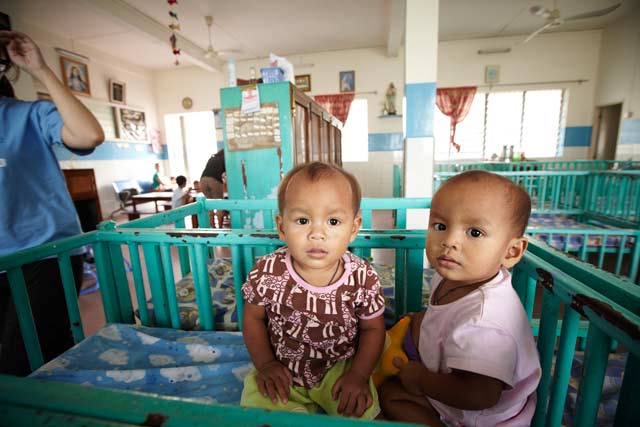Children wearing threadbare clothing flock around strangers yelling hello and fighting to grab their hands. Others sit distantly, unfazed by the latest batch of foreigners to arrive at their home. Songs break out, perhaps even choreographed performances, but within a couple of hours the tourists have gone, likely never to return.
The whirlwind calms and the orphans return to their lives.
Orphanage tourism is not a new concept to Cambodia, but it has become a niche market for those who ‘want to make a difference’. Some foreigners are attracted to orphanages out of a desire to help, others out of curiosity. Some visits are arranged by tour operators, others by hotels. For the likes of Tanja Klemt and Emanuele Galante, their tuk tuk driver suggested a trip to the outskirts of Phnom Penh to ‘have a look at’ an orphanage. With nothing else planned for their afternoon, the 20-year-old German and 30-year-old Italian thought: ‘why not?’

However, in a recently launched campaign to end orphanage tourism, child rights groups in the Kingdom have given plenty of reasons why tourists should not visit these centres. Initiated by Friends International and backed by the United Nations Children’s Fund, Unicef, and the government, the ‘children are not tourist attractions’ campaign says that despite the best intentions of tourists, visits to orphanages can do more harm than good.
These organisations are concerned that some of the 258 orphanages that exist in Cambodia are little more than thinly disguised businesses that exploit both children and tourists. “The vast majority of children living in orphanages are not orphans but still have their parents,” said Sebastien Morat, executive director of Friends International. Of the 12,000 children in Cambodian orphanages, nearly three-quarters of them have one living parent, said Morat. Only 26% have lost both parents.
“Poverty and lack of access to education are the main reasons parents send their children to orphanages,” says Myths and Realities About Orphanages in Cambodia, a report compiled by Friends International. With no social welfare system in place, “orphanages have become the most prevalent and easiest response to problems of poverty and social exclusion”.
Parents often place their children in institutions in a moment of acute crisis as a survival strategy; but short-term intentions often become long-term realities. This was the case for Chorn Chan Visal, who has been living at an orphanage for the past five years. “My father drank wine all day and argued with my mother. When he left us, my mother was too poor to look after me, so she decided to take me to the orphanage,” the 15-year-old boy said. “She lives very far away from me. I see her two times a year… I miss her.”
Operating more like a boarding school and less like an orphanage as conceived in the West, these residential care centres are likely called ‘orphanages’ in Cambodia because “it resonates with foreigners and thus makes it easier to raise funds”, Myths and Reality states.
While there are no figures available for how much revenue orphanages generate in the Kingdom, there appears to be much business potential for the industry. Over the past five years, the number of orphanages operating in Cambodia has increased by 65%, a growth rate that has alarmed Unicef and international child welfare organisations. “Many orphanages are actively recruiting children in poor provinces by convincing, coercing or even paying parents to give their children away,” according to Myths and Reality. The rate of growth in the number of orphanages has matched the increase in the number of tourists visiting the country during the same period.
Removing children from their family and institutionalising them prevents healthy development and has long-term impacts in their adulthood, said Boyd Bergeson of Indigo Psychological Services. With walk-in tourists also thrown into the mix, exposure to long-term psychological problems is intensified. “There is a specific disorder called reactive attachment disorder (Rad) in which children are inhibited and don’t feel comfortable making bonds with anyone,” said Bergeson.
Rad manifests itself in a variety of ways. In the most extreme cases people who suffer from it cannot develop the ability to form successful relationships and accept responsibility for their actions, and lack cause-and-effect thinking, empathy towards others and a conscience. “Or they may become disinhibited, where they’ll go up and give anyone a hug or go off with a stranger,” said Bergeson. This can happen when children under five have experienced emotional neglect from caregivers. Later on these children may be more susceptible to exploitation and peer pressure, which in turn can make them prone to alcohol and substance abuse.
“Having people come in and out of the orphanage disrupts the stability and routine established in a home, so is destructive for the emotional attachment of the child,” said Morat, adding that exposure to foreign languages and culture further disconnects them from Cambodia: “What would you say if a truckload of Cambodians came into an orphanage in Australia, or a house, or a school, came in brought rice, dried fish, taught them Cambodian songs, took photos and left after two hours? Everyone would go wild. So why is it okay to do it here?”
Screening visitors is another major area of concern for international child welfare agencies. “Many orphanages in Cambodia do not have child protection policies and do not implement the government’s minimum standards on alternative care,” said Morat. “Child protection is the number one rule, and you cannot have people come into the centre without being screened and supervised properly; these are basic standards.”
In October 2010, Nicholas Griffin, the British founder of an orphanage on the edge of Siem Reap, was prosecuted for sexually abusing children at the home. The 52-year-old completed half of his 30-month sentence in Cambodia and was then deported back to the United Kingdom, where he was arrested at Heathrow airport last month.
However, paedophilia isn’t the only form of abuse children are exposed to in some centres. They are sometimes kept in impoverished conditions in order to attract more donations from tourists. “Some orphanages use the plight of the children for financial gain,” said Bergeson. “Some intentionally keep the orphanages dirty, children underfed, wounds untreated, so when tourists come they feel exceptionally upset and inclined to give more money.
”Funding is a major headache for many orphanages in Cambodia; of the 258 operating, only 21 are state-owned. “It is eight times more expensive to look after a child in an orphanage than it is to support them at home,” Morat said. The director of one orphanage on the outskirts of Phnom Penh said that the centre regularly struggles to support its residents. It spends $30 a day on food, including 50kg of rice, to feed its 85 children. “Many people don’t realise how hard it is to secure funding. Relying on tourist donations is an erratic and unreliable source of funding,” said Morat.
If tourists want to donate money, according to Morat, it’s better to support the children’s teachers and mothers. “By supporting the teacher you can help more children. By buying products that the mothers make, you help build the powers of mothers to take care of their own children.
”Responsible orphanages like Sunrise Children’s Villages, which screens and supervises visiting sponsors and provides full education for its children, are already taking this initiative. It is looking to develop more community-based programmes to support families. “Rather than just take the children, we will be looking at ways of giving back to their village,” says country director Geraldine Cox of a programme that strives to improve homes and help mothers receive vocational training.Though the ‘children are not tourist attractions’ campaign has attracted much attention in the media, Morat said the road ahead is long. “Orphanage tourism won’t stop overnight. It is a process. The role of the orphanage must change, the understanding of what an orphanage is in Cambodia must change, and the funding sources must change.
“A lot of people come to Southeast Asia because they think it’s going to enlighten their spirit or something,” said Bergeson. “If tourists are doing it to feel good about themselves, then it’s a selfish thing to do that can potentially cause some serious psychological problems as well as abandonment, trust and bond issues.
Morat agrees. “If you’re here to please yourself there are other ways to do it which aren’t at the expense of children. Children are not here to help you feel better, make you happy or kill a couple of hours. It’s the opposite.”
“It would be very dangerous to build a lost generation in Cambodia; it happened in other countries, it happened in Australia. We know it’s wrong. So why are we doing this here?”



